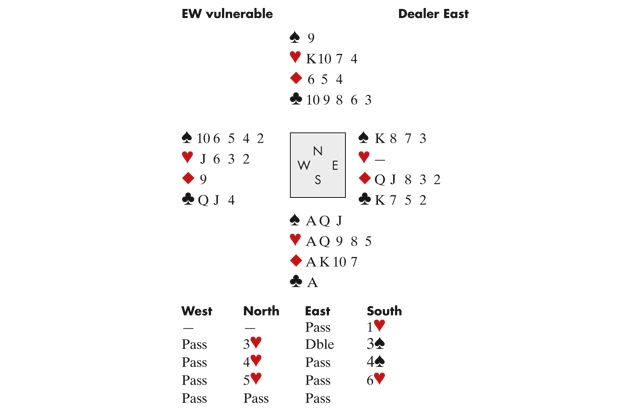There’s a bit of a ruckus going on in the bridge world at the moment; a lot of people are getting very hot under the collar. The issue is this: should the laws of the game always be enforced, or should players sometimes waive them in favour of creating a friendlier, more enjoyable atmosphere?
Many of England’s star players — David Gold, Artur Malinowski and Tony Forrester among them — are fiercely opposed to calling for ‘rulings’ at the table unless it’s strictly necessary: they feel it goes against the spirit of the game, and deters weaker players from playing in tournaments.
But others argue that rules are rules, and must be applied consistently, not according to an individual’s whims. Why should one player be let off a revoke, for instance, if the player at the next table has just been penalised for one?
At the centre of the storm are two of England’s top internationals, Frances Hinden and Graham Osborne. It all began when they called for a ruling at London’s Year End Swiss Teams. One of their opponents, Stefanie Rohan, opened 2♣ on the following hand:
♠AKJ98752 ♥ – ♦105 ♣AJ10
The final contract was 6♠, and 12 tricks were made — the same result at both tables. But after scoring up, Hinden and Osborne realised that the 2♣ bid hadn’t been ‘legal’. You may know that it’s illegal to ‘psyche’ a strong 2♣ opening (it’s too difficult to defend against). However, most people are unaware of the added stipulation that if the bid is based on 8 playing-tricks, then those tricks must be ‘clear-cut’ even against second-best breaks. Apparently this hand doesn’t quite make the grade if you consider the possible 4–1 spade breaks.
Team Hinden called for the director, who adjusted the score in their favour. But their decision to call for a ruling — and the ruling itself — has been widely criticised. Many have said it’s a travesty of the way bridge should be played. The 2♣ bid was clearly not a psyche (lots of players opened 2♣ on the hand; most experts insist it’s the only sensible bid). A rule created to protect weaker players from stronger ones was being used by stronger players to score points off weaker ones. Others have come to the team’s defence: don’t blame them for following the law, they say, blame this particular law for being an ass.
Whatever your view on rules and rulings, and on when they should be applied, the debate is long overdue.






Comments